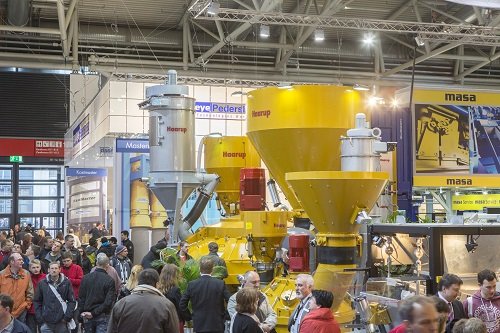- Automation and resource-efficiency remain a top priority
- Cost-effective manufacture of energy-efficient products
- Turnkey systems are in demand
There are still six months to go before the start of the world’s largest trade fair, but one thing is already clear: The next edition of bauma will again be a showcase for all the latest technology in construction and building material machinery. Top themes in all the sections of the exhibition will once more be resource- and energy-efficiency. The 31st edition of the World’s Leading Trade Fair for Construction Machinery, Building Material Machines, Mining Machines, Construction Vehicles and Construction Equipment takes place from April 11 to 17, 2016 at the Messe München exhibition center in Munich.
Johann Sailer, Chairman of the VDMA Association for Construction Machinery and Building Material Machines, confirms that “in building material machinery and systems, the trend towards automation is continuing, and this is coupled with an increase in resource-efficiency.” At the same time, he observed, there is strong global demand for energy-efficient precast concrete components and building materials.
Insulated double and sandwich walls are a good example of the impact of the trend towards automated, resource-efficient manufacturing of energy-efficient components. Vollert Anlagenbau, a German manufacturer of systems and plant, has a new workstation in its product portfolio that cuts insulation material for these panel walls entirely automatically, using a six-axle robot with a water-jet cutting head. Recently the Kerkstoel Group from the Belgian town of Grobbendonk started using this machine in its production of double walls, and already the company is reporting a considerable increase in output and quality, as well as better use of resources, thanks to optimized cutting processes.
Many manufacturers of precast concrete components have set themselves the strategic goal of increasing value-added. In pipe manufacturing, for example, this can be achieved through an advantageous combination of concrete pipe and synthetic liner. One example of this is a system produced by the Austrian company Schlüsselbauer Technology: It produces concrete pipes with a firmly anchored, high-density polyethylene (HDPE) liner and a flexible synthetic plug connector. These pipes, used mainly in sewerage applications, combine the robustness of concrete with the resistance of synthetics to chemical erosion. This new type of pipe has already been successfully used in open trenches and also in pipe jacking. According to Schlüsselbauer Technology, in both applications the plug connectors enable much faster progress in installation than with welded synthetic pipe connectors.
In the manufacture of concrete blocks and pavers, too, according to Masa GmbH, a plant and machinery manufacturer from Andernach, Germany, the market has for some years been moving towards higher quality products with a premium finish. And now, says Masa, some concrete block manufacturers have given up producing grey blocks entirely, because these currently generate the lowest return. Masa and other manufacturers of machines to produce blocks and pavers are making small changes to their systems to accommodate these market requirements.
At Masa, their customers for block-making plant often order complete systems,
ready fitted with the optional mixing and dosing systems for colored concrete and various surface treatment systems. These comprehensive solutions fit in very well with the current thinking in the sector: “In the manufacture of building material systems and plant, the trend is towards turn-key projects; demand for individual machines is ever less,” said Sailer.
Further information on bauma: www.bauma.de
 Constructionshows
Constructionshows
